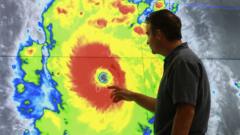In a sweeping move, the National Oceanic and Atmospheric Administration (NOAA) has laid off nearly 880 employees, including many crucial weather forecasters. This decision is part of the Trump administration's ongoing strategy to reduce the size of the federal workforce, led by Elon Musk at the newly formed Department of Government Efficiency (Doge).
The layoffs, announced on Thursday, come as the NOAA, which previously operated with roughly 12,000 staff, navigates a turbulent landscape fueled by budget cuts and personnel reductions aimed at trimming government spending. An agency spokesperson stated they would refrain from commenting on internal matters regarding personnel.
Amid the chaos, affected NOAA staff have taken to social media to express their dismay. Zack Labe, a climate scientist, tweeted about his termination from NOAA, where he contributed to enhancing machine learning and AI applications for weather forecasting. Responses from lawmakers demonstrate a deep concern about the ramifications of these cuts. Congressman Jared Huffman emphasized that NOAA's work is essential for public safety, providing free and accurate weather forecasts critical for millions of Americans.
The repercussions of the layoffs extend beyond NOAA itself; private sector meteorological services rely heavily on data and forecasts generated by the agency. Industry experts, such as Daniel Swain, highlighted that many of America's commercial weather enterprises are built on NOAA's publicly funded resources and expertise. This underlines the essential role the agency plays during severe weather conditions, aiding the National Hurricane Center and National Weather Service in their life-saving missions.
Criticism of the cuts has also emerged from environmental advocates. Miyoko Sakashita from the Center for Biological Diversity lamented the impact these reductions would have on vital programs designed to safeguard lives, labeling the actions taken by Musk and his department as harmful to public welfare.
The timing of these decisions coincides with a recent issue surrounding purported compliance directives sent to federal employees requiring them to list their weekly achievements or face termination. This email sparked confusion among various federal agencies, leading to contradictory responses about compliance. Musk's assertion that some workers might represent "non-existent" identities further fueled controversy and distrust within the workforce.
Additionally, a federal judge in San Francisco has indicated that recent mass firings of probationary employees might have violated the law, prompting scrutiny over the legality of these employment cuts. As NOAA faces these unsettling changes, stakeholders are left grappling with the uncertain future of critical climate research and public safety initiatives.
The layoffs, announced on Thursday, come as the NOAA, which previously operated with roughly 12,000 staff, navigates a turbulent landscape fueled by budget cuts and personnel reductions aimed at trimming government spending. An agency spokesperson stated they would refrain from commenting on internal matters regarding personnel.
Amid the chaos, affected NOAA staff have taken to social media to express their dismay. Zack Labe, a climate scientist, tweeted about his termination from NOAA, where he contributed to enhancing machine learning and AI applications for weather forecasting. Responses from lawmakers demonstrate a deep concern about the ramifications of these cuts. Congressman Jared Huffman emphasized that NOAA's work is essential for public safety, providing free and accurate weather forecasts critical for millions of Americans.
The repercussions of the layoffs extend beyond NOAA itself; private sector meteorological services rely heavily on data and forecasts generated by the agency. Industry experts, such as Daniel Swain, highlighted that many of America's commercial weather enterprises are built on NOAA's publicly funded resources and expertise. This underlines the essential role the agency plays during severe weather conditions, aiding the National Hurricane Center and National Weather Service in their life-saving missions.
Criticism of the cuts has also emerged from environmental advocates. Miyoko Sakashita from the Center for Biological Diversity lamented the impact these reductions would have on vital programs designed to safeguard lives, labeling the actions taken by Musk and his department as harmful to public welfare.
The timing of these decisions coincides with a recent issue surrounding purported compliance directives sent to federal employees requiring them to list their weekly achievements or face termination. This email sparked confusion among various federal agencies, leading to contradictory responses about compliance. Musk's assertion that some workers might represent "non-existent" identities further fueled controversy and distrust within the workforce.
Additionally, a federal judge in San Francisco has indicated that recent mass firings of probationary employees might have violated the law, prompting scrutiny over the legality of these employment cuts. As NOAA faces these unsettling changes, stakeholders are left grappling with the uncertain future of critical climate research and public safety initiatives.





















